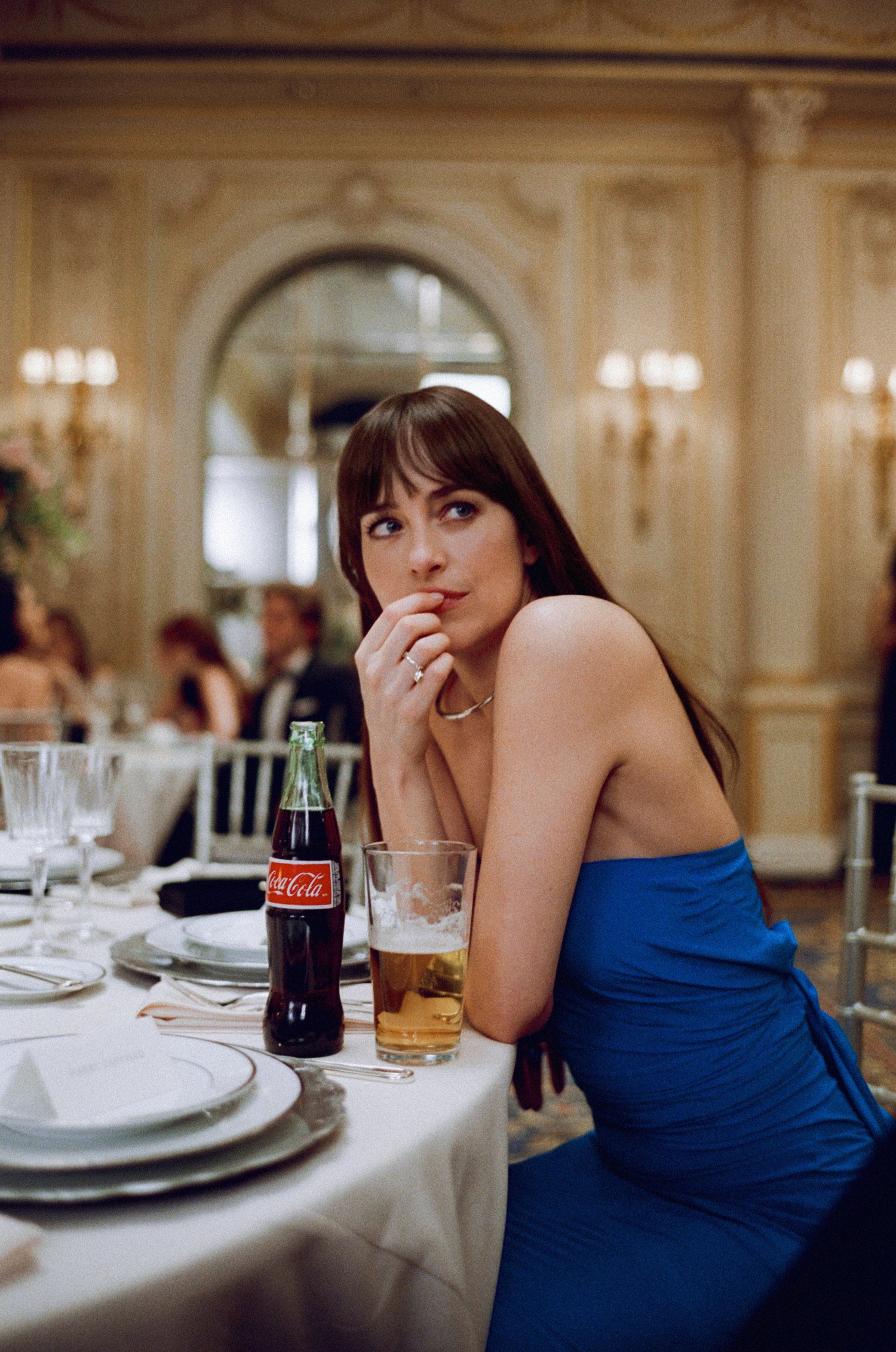Images courtesy of A24
MATERIALISTS— 4 STARS
Probably the most innocent motif of Celine Song’s Materialists is an act of affection seen opening the film and echoed again at its closing. In both scenes, a man who has proudly procured a bundle of brilliant white flowers is shown wordlessly twisting the stem of a small one into a promise ring to slide onto the finger of the woman he loves. The only difference between the two scenes is that one takes place between a pair of doting hunters and gatherers outside a cave post-Ice Age, and the other is between two affluent New Yorkers on a Central Park bench in the 21st century.
LESSON #1: DO FLOWERS STILL WORK?—Evoking caveman courtship, the identification of beauty, and self-made inventiveness, the male has taken the lead and acted upon his feelings. Spanning years long before and plenty of years after the immortal words of Beyoncé, he liked it, and he put a ring on it. Using a flower is an economical yet personal gesture of devotion, one well-received in their moments by both ladies in Materialists. Borrowing even more words, this time from Hail, Caesar!, would that it were so simple? It can be, yet then it isn’t. Celine Song shows us in her follow-up to Past Lives that we’ve come a long way… and also not.
The game of relationship chess in Materialists flows through Dakota Johnson as Lucy, an account specialist working for Adore Matchmaking in New York City. During the prefacing montage of her career, which opposes the notion of matchmaking being antiquated or regulated to Old World senior citizen hunches, and plays nice and punchy with composer Daniel Pemberton’s peppy score, Lucy is celebrated at the firm for securing her ninth marriage from her client pool, which appears to be an office record amongst the other high-powered gals at Adore. Her unvanquished method of success relies on aligning the data and playing both sides of the emotional investment.
LESSON #2: CHECKING BOXES– Through an extensive interview process of the clients and the dating candidates across both genders, Lucy thrives on metrics. Personality, specialties, and niche appeals are secondary. Instead, profession, wealth, age, education level, and a plethora of physical measurements from height and weight to BMI and hairline length are seen as market value data points and boxes to check with Lucy and Adore. It all boils down to a maudlin math Lucy harps on all film. If you, the viewer, buy into the same charming calculus, Materialists will hook you from the onset.
LESSON #3: THE BUSINESS OF MARRIAGE—All that semantic sentimentality leads to materialistic favorability, hence the title of the film. Her service qualifies as a luxury good, as people are spending a tremendous amount of time, money, and effort to essentially settle. Lucy doubles down on her reliance on the metrics with an unflappably cynical attitude that removes the flutters of romance or soul mates and emphasizes the business decision at the core of marriage. In her eyes, she humorously sees her work as a merger of the skillsets of a mortician and an insurance claims adjuster. She’s fitting people with the person they are going to die with and doing her level best to dodge the many risks with an “onward and upward” mantra. Adore markets both the pettiness and extrinsic value of the institution of marriage against each other.
Celine Song and Dakota Johnson demonstrate this level of calculated control in a brilliant first-act scene. Lucy is attending that aforementioned ninth wedding as a touted guest when the bride is experiencing cold feet, holed up in her opulent hotel suite in a big dress with streaking mascara and blubbering tears. The only person who can talk the woman off the cliff to the altar is not her sisters or any of her fleet of bridesmaids, it’s her matchmaker, saying all the right things to assuage fears and, most importantly, secure the deal. This begins a trend in the Materialists where every Celine Song line of dialogue is smooth as silk, even when it’s conveying bad news or delivered with somewhat flat plainness from Dakota Johnson, an actress who is no stranger to that negative critique.
Watching this last-minute rescue and fluttering buzz occur with astonishment is Pedro Pascal’s Harry Castillo, the best man of the wedding and new brother-in-law of Lucy’s client. Introduced wearing a dapper tuxedo looking like a thirsty fucking Chilean James Bond, Harry cannot help but be endlessly impressed. He seeks Lucy out at the reception, not for her services—of which she promises immediate success—but to date her. Despite being a 10-out-of-10 golden goose of perfect metrics, Harry skips around her math and doesn’t care to marry someone of equal socioeconomic stature. Rather, he values her independence and intangibles.
Right as flirtatious sparks are flying between Harry and Lucy, John, Lucy’s ex-flame, played by the second-billed Chris Evans, arrives. He’s a struggling actor moonlighting as a waiter and server for the catering company at this very wedding. As fate would have it, John spots her and brings her two favorite refreshments—a Coke and a beer—on a surprise cue at the precise moment a conversation peaks with Harry. Sure enough, he sucks at math. Nevertheless, John’s arrival means that triangular geometry has now been added to the equations of Materialists.
LESSON #4: KNOWING SOMEONE AS A PERSON AND NOT A METRIC— Even though John and Lucy haven’t seen each other in quite some time, the poignant history and unsevered connection are instantaneous and fleshed out by remembered flashbacks. Harry represents Lucy’s professional goal of marrying rich and comfortable, which is the opposite of the poverty she lived in and resented with John years ago. Conversely, John stands forth as someone who knows Lucy as a person, running against Lucy’s assessed tenets of measurables. They get each other to a T, even if John cannot provide for the finer things she has come to require. Staying balanced, neither man is the outright hero or villain of this story, and neither needs to be.
Materialists creates and muses upon this dual psychology for love and comfort, resting solely on decisions required of Lucy. The age-old questions of “Why do you like me?” or, more profoundly, “Why do you love me?” move a scale between feeling valuable and being valuable. To even reach that point, the chess game of dating and courtship comes first, where success and failure tip their own scale between feeling worthwhile and feeling worthless, depending on the tenuous results and trajectories. Chipping away at typical romantic comedy tropes and expectations, Celine Song dramatically examines the fragile emotions put in jeopardy during the quest for love and lasting relationships.
Banking on her storytelling conviction, Celine leads Materialists to a drastic twist when one of Lucy’s clients, a woman named Sophie (Succession’s Zoë Winters), arrives at a nightmarish dating scenario. The emergency jars Lucy and, summarily, the entire movie, as a professional crisis is thrust against personal bliss when the themes crash into each other during the narrative. For a stretch of Materialists, confidence is rattled, the hope of love is lost, and any rom-com gamemanship ends, as a more necessary, heavy, and therapeutic arc takes over.
Admittedly and appreciably, for as bracingly honest as this swerve is in Materialists to emphasize the aforementioned risks that embody the reality of dating for many people—luxury level or otherwise, it is such a downer of a turn that it threatens to mar the good graces established by that opening scene’s instinctual simplicity of a shared flower. Unfinished feelings are still hoping to blossom before the end of the movie between our pretty polygon, and it’s difficult to come back from the darkness to still shine sunlight on that desire. We want what Celine Song wants, challenges and all.
LOGO DESIGNED BY MEENTS ILLUSTRATED (#1312)



